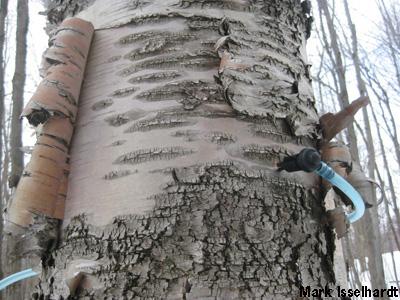Birch Syrup Production to Increase the Long-Term Economic Sustainability of Maple Syrup Production in the Northern Forest

Maple syrup production is a vital part of the Northern Forest economy and working landscape. Maple producers in the region face increasing challenges to maintain profitable operations while keeping syrup prices affordable due to rising costs of production. Adding birch syrup production may be a practical and ecologically-sustainable way for producers to increase revenues, and thus the profitability, of maple operations.
Birch syrup production is very similar to maple production, uses maple equipment and tools, and the sap flow period begins as the maple sap flow season ends. Birch syrup is valuable and in demand by retail consumers and chefs desiring natural, locally-produced sweeteners and food ingredients. The low sap sugar content and short sap flow period that have limited yields and profitability of birch syrup production in the past should be mitigated by using modern equipment and practices, including reverse osmosis and vacuum systems.
During two sap flow seasons, NSRC researchers in Vermont determined that on average 0.14 gallons or 18.3 ounces of syrup can be produced annually from a paper birch tree tapped using modern equipment and practices. Yields were comparable to those obtained in commercial birch syrup operations. Financial analyses indicated these yields would be sufficient for birch production to result in a net profit when added to an existing maple operation under a variety of scenarios of birch tree availability and value of birch syrup crop. Findings indicate that birch syrup can be produced profitably, and this can be a way to increase revenues and long-term economic sustainability of existing maple operations in the Northern Forest.
